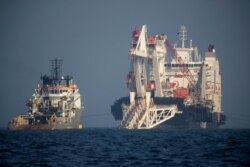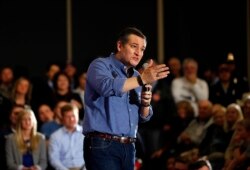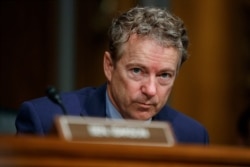This story originated in VOA’s Ukrainian Service. Some information is from Reuters.
WASHINGTON — The Senate Foreign Relations Committee on Wednesday approved legislation to sanction construction of the underwater Nord Stream 2 pipeline from Russia to Germany.
“Protecting Europe’s Energy Security Act,” which passed committee by a 20-2 vote, reflects some lawmakers’ concerns over Russian influence in Europe and would require passage in the Senate and House before being signed into law by President Donald Trump.
The Trump administration has consistently voiced opposition to the development of Nord Stream 2, an offshore pipeline that would deliver Russian gas to Western Europe via the Baltic Sea.
Expanding upon the existing Nord Stream 1 pipeline, which has been transporting gas from Russia to Germany along the same Baltic Sea route since 2011, Nord Stream 2 would roughly double Russia’s export volume.
In a rare example of political comity, U.S. legislators in both chambers largely support sanctions on Nord Stream 2 — a companion bill passed the House Foreign Affairs Committee last month — and Trump’s opposition to the $11 billion, nearly 1,300-kilometer (800-mile) pipeline expansion is consistent with that of his immediate predecessor, former President Barack Obama, and former President George W. Bush, who opposed Nord Stream 1.
Mostly completed
The Nord Stream 2 project, which has mostly been completed, is led by the Russian state-owned gas company Gazprom, with half of the funding provided by Anglo-Dutch firm Shell, Austria’s OMV, France’s Engie, and Germany’s Uniper and German-BASF’s Wintershall unit.
Since at least 2001, White House administrations have pushed for Germany to buy American liquefied natural gas (LNG) in an attempt to overtake a sector of the market long-dominated by Russian distribution routes that run through Ukraine.
Poland and Lithuania, who are among Nord Stream 2’s most vociferous European critics, have built LNG terminals that would stand to profit from an American takeover of the market. But other former Soviet satellite nations, such as Ukraine, Latvia and Estonia, have long warned that a growing reliance on Russian energy not only compromises European security, but reward Russia’s 2014 annexation of Crimea and other campaigns to destabilize the European Union.
“Russia has a history of using energy as a weapon,” Republican Senator Ted Cruz said Wednesday. He is one of the measure’s sponsors, largely echoing the conviction that further interlinking Russia and Germany would give Moscow greater geopolitical leverage over Europe at a time of heightened international tensions.
There have been numerous price disputes between Moscow and Kyiv over natural gas deliveries to Ukraine, whose pipelines serve other European nations. In 2009, a disagreement between the two nations cut natural gas supplies to Western Europe in the middle of winter, leaving many without heat.
But experts such as David Koranyi, energy policy adviser at the United Nations, told a recent gathering of the U.S. Helsinki Commission that Europe has learned from that experience.
“I remember very vividly how Europe reacted to the crisis in 2009, and how unprepared most of the Central-Eastern European countries were in those days,” he told VOA’s Ukrainian Service. “But I look at the picture now, and I have to say there are updates. My country, Hungary, is already filling up its fuel storage facilities. By the end of September, they will be filled, which means that we will have gas for the entire winter.”
US warning
A U.S. State Department official, however, warned that Russia is pursuing Nord Stream 2 so that it no longer has to rely on sending gas supplies via Ukraine, where it is militarily backing a secessionist insurgency in the east.
“This is a fundamentally political situation,” said Colin Cleary, director for energy diplomacy for Europe at the State Department’s U.S. bureau for energy resources, adding that completion of Nord Stream 2 dramatically weakens Ukraine’s bargaining position with an occupying nation.
“You have a country, Russia, that has annexed territory of the transit country,” he told VOA. “So this is not a normal commercial situation. The question is ... why should Europe allow that to happen?”
A new U.S. sanctions regime against Nord Stream 2 could also affect other natural gas export pipelines from Russia, including the TurkStream pipeline.
Cruz’s bill is one of a handful in Congress looking to impose sanctions on the project. The measure would penalize ships that lay Russian energy export pipelines at depths of 30 meters (100 feet) or more below sea level, a stipulation that could also apply to the TurkStream gas pipeline.
Republican Senator Rand Paul and Democratic Senator Tom Udall were the panel members who voted against the bill. Paul complained that it sanctioned U.S. allies and harmed international companies that employ thousands of Americans, a point the bill’s backers dispute.
Senator Bob Menendez, the panel’s top Democrat, said he backed the bill, but that it was important to reinforce U.S. ties with Berlin.
As Europe’s biggest natural gas consumer, Germany relies on Russia for roughly half of its gas imports, which account for 20 percent of its current energy mix. The International Energy Association projects German natural gas demand to increase by 1 percent in the next five years, as Berlin continues phasing out its nuclear power plants by 2022.
Former German Chancellor Gerhard Schroeder, a longtime friend of Russian President Vladimir Putin, has championed the Nord Stream enterprise since just before being voted out of office in 2005. He soon went on to lead the shareholder committee of Nord Stream AG, a consortium for construction and operation of the undersea pipeline, eventually becoming chairman of the Kremlin-controlled Rosneft, Russia’s largest oil company.
At last week’s meeting of the Helsinki Commission, numerous experts warned that a current gas transit contract between Ukraine and Russia is scheduled to expire Jan. 1, 2020, which could trigger a fuel crisis in Europe and possibly give Moscow more leverage to push for completion of Nord Stream 2.
Trilateral gas talks between the EU, Ukraine and Russia are scheduled for September.







